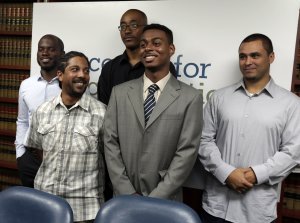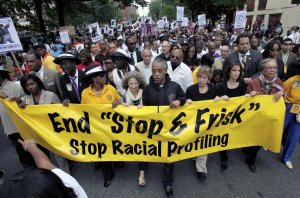PA Bill Number: HB660
Title: Providing for minimum energy and water efficiency standards for certain products sold in this Commonwealth; imposing penalties; and making repeals.
Description: Providing for minimum energy and water efficiency standards for certain products sold in this Commonwealth; imposing penalties; and making repeal ...
Last Action: Referred to Consumer Protection & Professional Licensure
Last Action Date: Feb 13, 2026
Sorry Bloomberg, your money doesn't give you a right to suspend the 4th Amendment :: 08/13/2013
Bloomberg, one of our favorite persons to write about, has more detractors than he thinks. The courts have spoken. Sorry, Bloomey, but even your money doesn't trump the United States Constitution.In typical arrogant fashion, he says he'll appeal, even though he won't be Mayor by the time the appeal is thrown back in his face.
COLLEEN LONG 1 hour ago?
NEW YORK (AP) - A federal judge's stinging rebuke of the police department's stop-and-frisk policy as discriminatory could usher in a return to the days of high violent crime rates and end New York's tenure as "America's safest big city," Mayor Michael Bloomberg warned.
The ruling strikes at the heart of the legacy Bloomberg aims to leave when his third and final term ends this year. He said he would appeal but likely won't be around long enough to deal with the repercussions.
"This is a dangerous decision made by a judge who I think does not understand how policing works and what is compliant with the U.S. Constitution as determined by the Supreme Court," Bloomberg said. "I worry for my kids, and I worry for your kids. I worry for you and I worry for me. Crime can come back any time the criminals think they can get away with things. We just cannot let that happen."
U.S. District Judge Shira Scheindlin declared Monday that police have intentionally and systematically violated the civil rights of tens of thousands of people by wrongly targeting black and Hispanic men.
She appointed an outside monitor to oversee major changes to the tactic, including reforms in policies, training and supervision. And she ordered a pilot program to test body-worn cameras in the some of the precincts where most stops occurred.
View gallery

Nicholas Peart, Lilat Clarkson, Leroy Downes, Devin Almonar and David Ourlicht, left to right, plain...
"The city's highest officials have turned a blind eye to the evidence that officers are conducting stops in a racially discriminatory manner," she wrote. "In their zeal to defend a policy that they believe to be effective, they have willfully ignored overwhelming proof that the policy of targeting 'the right people' is racially discriminatory."
But Bloomberg said police have done exactly what the courts and constitution allow to keep the city safe, reiterating the tactic was one tool that has helped drive down crime to record lows. The ruling could result, he said, in a return to the days of crime and mayhem, when murders hit an all-time high of 2,245 in 1990. Killings hit an all-time low of 418 in 2012.
Scheindlin refused to hear testimony on crime rates, and her ruling skewered the city's defense of the practice and argument that it effectively polices itself.
Stop and frisk has been around for decades in some form, but recorded stops increased dramatically under the Bloomberg administration to an all-time high in 2011 of 684,330, mostly of black and Hispanic men. The lawsuit was filed in 2004 by four men, all minorities, and became a class-action case.
About half the people who are stopped are subject only to questioning. Others have their bag or backpack searched, and sometimes police conduct a full pat-down. Only 10 percent of all stops result in arrest, and a weapon is recovered a small fraction of the time.
View gallery

FILE - In this June 17, 2012, file photograph, the Rev. Al Sharpton, center, walks with demonstrator...
Scheindlin noted she was not putting an end to the practice, which is constitutional, but was reforming the way the NYPD implemented its stops.
The judge presided over a 10-week bench trial this year that included testimony from NYPD brass and a dozen people - 11 men and one woman - who said they were wrongly stopped because of their race. She found that nine of the 19 stops discussed in court were unconstitutional, and that an additional five stops included wrongful frisking.
In her long ruling, she determined at least 200,000 stops were made without reasonable suspicion, the necessary legal benchmark, lower than the standard of probable cause needed to justify an arrest. She said that rank-and-file officers were pressured by superiors to make stops - and that police brass ignored mounting evidence that bad stops were being made.
Witness Nicholas Peart, who wept on the stand during the trial as he described a frightening encounter with police, said Monday that he hoped the ruling would mean "tremendous steps forward."
"I felt that it restores a sense of trust," said the 24-year-old Peart, who is black. "Our voices do count, and count towards something greater."



